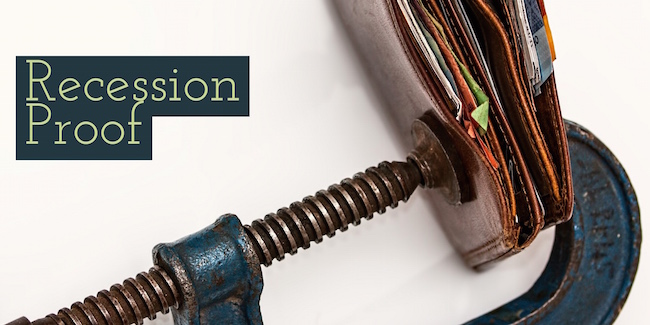When the financial crisis struck Wall Street in 2008, the reverberations extended to small businesses on Main Street. Not many businesses had incorporated recession-proof strategies to help get them through the crisis.
Banks froze new credit lines, making it harder for businesses to keep their doors open and maintain their workforce. In only two years, 1.8 million enterprises shuttered their operations. Almost nine million were laid off. Startups became an endangered species. Unemployment rose higher than it had in six decades.
It’s taken more than a decade for the economy to recover from this trauma, and a number of indicators continue to lag.
This recent history seems increasingly relevant lately. International trade conflicts, a touch-and-go stock market, geopolitical instability, and a stagnating global economy might indicate another recession is around the corner.
With the memory of the devastation the last downturn brought still fresh, the possibility of another slump should raise serious questions in the business world. Could your business weather a financial crisis? What practical steps can you take now to recession-proof your organization?
Businesses that survived the crash shared a number of key strategies that enabled them not only to stay resilient, but they were also able to prosper in crisis.
Table of Contents
ToggleTrim wasteful costs.
In a recession, everyone has to get lean to survive. Why not start now? Companies of all kinds can reduce unnecessary expenses by analyzing outflows thoroughly and thinking creatively about alternatives. For example:
- Negotiate lower rent with your landlord. Occupied space at a lower rate is better for real estate brokers than vacant offices. Signing a longer lease or paying in advance may improve your bargaining position further.
- Join a group purchasing organization to leverage bulk buying discounts on necessities.
- Shop around for better prices on utilities. Ask your current providers to match competitors’ offers or switch if you find a deal.
- Limit expenditures that don’t contribute significantly to your bottom line or to company morale.
Invest strategically to keep your company competitive.
Spend money before a recession? Absolutely. Just do it carefully.Keep in mind:
- Downturns bring opportunities for an enterprising company.
- Struggling competitors may make it easier to position your brand.
- Rising unemployment may make it easier to attract top talent.
- Falling real estate prices may bring down building costs.
To take advantage of these windfalls, you’ll need to have savings in reserve. Being smart with your investments now will make it easier for you to come out of a financial crunch ahead.
Don’t sacrifice so much that you lose your customers.
Financial discipline matters in a recession, but there can be too much of a good thing. Hollow out your offerings too much and your clients could feel alienated.
Whatever’s going on behind the scenes at your workplace, make sure your loyal customers can experience continuity from you. They’ll stay confident in your resilience if you continue providing the top-notch service that made them patrons in the first place.
Remember: most small businesses get more than half their revenue from returning buyers, and repeat customers spend a third more than new clients.
Cut once, cut deep, and cut your own salary first.
To survive a recession, even the strongest companies may have to consider layoffs. Leaning out your staff before a catastrophic downturn could leave you in a better position when budgets tighten.
It’s never easy, but experts say being decisive and fair when making cuts goes a long way. Here are some concrete tips for going about making workforce reductions:
- Reduce hours before reducing pay. You’ll bank the same savings, but without arousing worker resentment.
- Never cut in rounds. Unless you want unproductive employees worried about what’s coming next, get it done up front. Then your team can focus on turning things around.
- Start with yourself. Your employees will respect you if you lead by example. Reducing their income while stabilizing your own feels hypocritical. Don’t ask them to do anything you’re not willing to do yourself.
Treat recessions as inevitable.
Despite troubling indicators all around them, many firms were blindsided by the financial collapse in 2008. They never planned for a catastrophe. That improvidence came back to haunt them.
By contrast, organizations that endured this recession treated it as a feature of the market system, not a bug. It’s not a question of if the economy will sour, but when and how it does. They planned for the worst-case scenarios so they could come out with the best outcomes. Expecting downturns can feel sobering. But, such realistic, recession-proof planning pays dividends when crisis strikes.
Time to Add Recession-Proof Measures
The financial crisis of 2008 offered valuable insight into how businesses can protect themselves against a recession. Resilient businesses expect recessions as a matter of course and plan for adverse conditions. They get lean, but never at the expense of competitive advantage. They maintain strategic relationships with clients and employees. This behavior allows them to thrive even in the most challenging circumstances.
The lessons of 2008 are clear. Are businesses learning from them by adding recession-proof strategies?














